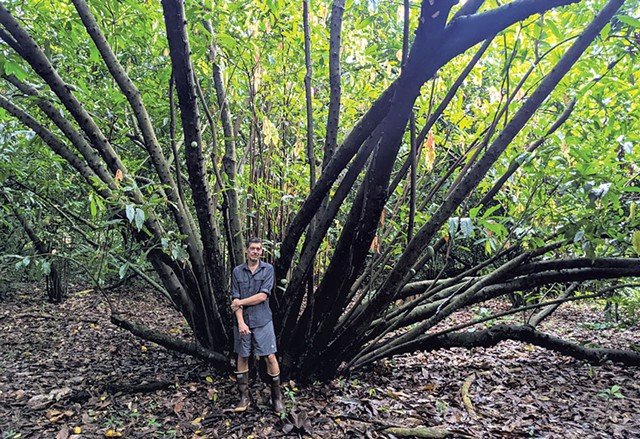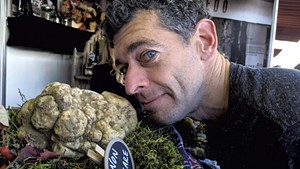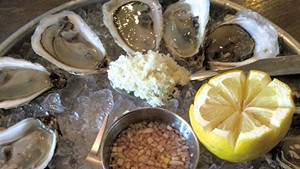
- Courtesy
- Rowan Jacobsen standing by an ancient cacao tree in Bolivia
In his new podcast, "Obsessions: Wild Chocolate," award-winning food and nature writer Rowan Jacobsen of Calais takes listeners into the depths of the rain forest in search of culinary gold: cacao.
Jacobsen follows bean hunters as they experience ecstatic dance, financial ruination and the bliss of tasting chocolate made from the seeds (also called beans) of wild cacao trees.
It's a wild ride, so we asked Jacobsen to tell us more about his experience making the podcast.
SEVEN DAYS: In "Wild Chocolate," you refer to some of what you taste as "god-level" chocolate, which can cost up to $50 for a small bar. What makes this chocolate rare and special?
ROWAN JACOBSEN: It's a lot like wine. It's easy to make basic wine out of grapes that grow abundantly, but certain varieties of grapes, grown on less productive hillsides and carefully harvested and fermented, can produce wine with much more complex flavors.
With chocolate, certain varieties of cacao trees produce beans with much more interesting floral and fruity flavors, but the industry abandoned them for higher-yielding varieties a century ago. But these heirlooms are still out there in the Americas. And now there is a kind of treasure hunt to find them before they go extinct. (And there is a new wave of small "bean-to-bar" chocolate makers who are happy to pay more for better-tasting beans.)
Eating this new chocolate can be thrilling, because it has all kinds of flavors that people don't even associate with chocolate.
SD: Many probably think of "food journalist" as a fairly safe profession, but this podcast touches on killer ants, ayahuasca ceremonies and being forced to land on an airstrip used by cocaine smugglers. Was this the most risky reporting you've ever done?
RJ: There have been some hairy moments, for sure, but doom never felt like it was around the corner. But, yes, a lot of wet, muddy nights and ticks and low-grade tropical yuck.
I did some war reporting in Myanmar a decade ago that was more dangerous, but even then, as long as you didn't freak out and do something stupid, it would all be fine.
Plus, we tend to amplify the unfamiliar risks and ignore the familiar ones. I'm certain that the biggest risk I've taken was simply driving down the road in India. And probably skating on ponds in Vermont is No. 2!
SD: Your books are often deep dives into the history and lore of specific foods: oysters, apples, truffles. What food are you most excited about right now?
RJ: While working on a piece, I often discover some new food passion that has nothing to do with my main topic. For instance, while in Brazil writing about chocolate, I discovered cupuaçu, a fruit that is related to cacao. It has big brown pods with whitish pulp inside that is just ridiculously fragrant. It's kind of like a mix of passion fruit and banana, but that doesn't really capture it, because it has these unique aromatics that we have no words for. And it's incredibly addictive. The weird thing is that it's super common in Brazil but completely unknown here.
We have this sense that all the good stuff has been found and popularized, but the larger takeaway is that the food we eat is the stuff that industrializes well, not necessarily the stuff that's the most interesting/fun/healthful.
This interview was edited and condensed for clarity and length.








Comments
Comments are closed.
From 2014-2020, Seven Days allowed readers to comment on all stories posted on our website. While we've appreciated the suggestions and insights, right now Seven Days is prioritizing our core mission — producing high-quality, responsible local journalism — over moderating online debates between readers.
To criticize, correct or praise our reporting, please send us a letter to the editor or send us a tip. We’ll check it out and report the results.
Online comments may return when we have better tech tools for managing them. Thanks for reading.